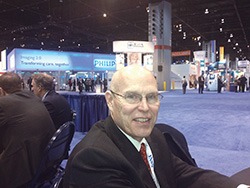Fayettevilles CardioWise Hopes to Change Heart Treatment
by December 24, 2012 12:00 am 210 views

Fayetteville startup CardioWise wants to take magnetic resonance imaging a step further by developing three-dimensional models of a patient’s heart and, in the process, change the way cardiovascular disease is treated.
The technology, developed during the past decade by scientists at Washington University in St. Louis, was brought to Fayetteville by Virtual Incubation Co., which licensed the work of researchers Michael Pasque and Brian Cupps. CardioWise is a VIC portfolio firm that represents the effort to commercialize the patent-pending software developed from that research.
The software, called Multi-Parametric Strain analysis, processes cardiac MRIs to provide a 3-D strain map of the heart’s left ventricle. CEO Jack Coats called MPS the “single definitive gold standard for diagnosing cardiovascular disease.”
The software, he said, is non-invasive, tells doctors how well a heart is pumping blood, and produces a “quantified 3-D model” of a patient’s heart while adding “unbiased outcome measurements” to MRI results.
Coats said MRI results are subject to the “bias” of whoever is reading and interpreting them. MPS makes imaging tests definitive by removing that potential bias while rendering unnecessary the additional testing that often results because of it, he said.
Other advantages include reliability and compatibility with virtually all MRI systems in the U.S., increased diagnostic efficiency and lower costs. It takes the sophisticated imaging capabilities of MRI, Coats said, and makes them better.
VIC licensed the patent, software and heart database from Washington University in 2011, and earlier this year brought in Coats to serve as CEO and Omid Moghadam, VIC’s executive vice president, to chair its board.
Coats is based in the Washington, D.C., area, but said he is in Fayetteville, where CardioWise maintains office space at VIC headquarters, at least once or twice a month.
Over a span of about the last two months, Coats has stayed busy fundraising and meeting with prospective clients. Between angel investments and the Arkansas Development Finance Authority, CardioWise has secured $150,000 since the end of October.
The company also recently secured a $100,000 investment and royalty agreement with the Arkansas Science & Technology Authority, and is awaiting word on a National Science Foundation grant that could result in another $150,000. CardioWise also submitted, in concert with Washington University, a proposal that could net a $150,000 National Institutes of Health grant.
Such funding allows for the hiring of employees and the commercialization of the company’s software. And while the bulk of the hiring and equipment purchases are “down the road,” Coats said, CardioWise actively is looking for a chief technology officer.
Coats also came across somewhat unexpected sources of interest. In early November, he attended an American Heart Association meeting in Los Angeles, where he talked to numerous pharmaceutical, biotechnology and medical device companies about clinical trials that could benefit from CardioWise’s product.
Baxter Healthcare Corp., for example, is interested in determining if CardioWise’s product can aid it in the Phase III clinical trials of a stem-cell treatment for refractory angina. About 50 major institutions are involved in the Phase III trials, including the Mayo Clinic and Massachusetts General Hospital.
Coats also talked to companies like Novartis and Medtronic to gauge their interest in using CardioWise analysis for their clinical trials.
“Essentially what that would do for us is provide opportunities for quicker market recognition and revenues than if we went into market by ourselves,” Coats said.
Coats and Moghadam were among about 60,000 people who attended the Radiological Society of North American meeting in Chicago the weekend after Thanksgiving.
The two met with representatives from General Electric, Siemens and Philips, among others, and have follow-up meetings planned with those three companies at the Society for Cardiovascular Magnetic Resonance meetings in San Francisco Jan. 31-Feb. 3.
GE, Siemens and Philips are the largest MRI suppliers in the world, Coats said.
“November was a big month,” he added.
Rob Keys of the Northwest Arkansas Business Journal contributed to this report.
